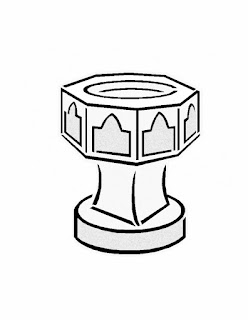Grace Episcopal Church, Galveston
Gospel: John 17:6-19
13 May 2018
I was blessed to hear Bishop Doyle preach at Christ Church Cathedral on a Mother's Day some years ago. He included in his sermon a simple but poignant poem by Billy Collins entitled "The Lanyard." I'm beginning my sermon today by referencing this poem. (It may be found in Collins' collection The Trouble With Poetry first published by Random House in 2005.)
You can listen to Collins read the poem himself at this link:
Billy Collins Reading "The Lanyard"
Collins' poem addresses a profound subject: the timeless idea that the sacrifices a mother makes for her children are such that no son or daughter could ever repay them. You know...it's similar to the concept that the best from this life, things like friendship, sunsets, and a parent's love, cannot be bought for any price... a poignant lesson in our contractual-based, everything-is-for-sale world. Collins points toward this huge concept with the boy’s “rueful admission” that he once thought his lanyard gift had somehow repaid his mother in full.
I should acknowledge that our experiences of our own mothers will differ. The range of actual experience, I suppose, goes from warm and nurturing all the way to cold and distant or even absent. As a young adult, I would get stuck on my experience as a teenager and how I was embarrassed to the core by my mother’s eccentricities. (Perhaps you will hear a sermon on that later.) As the years go by, I have more compassion for her and have come to appreciate the sacrifices and life that she gave to me….so much so that, like the boy in Collins’ poem, I know I am completely without the ability to repay what she gave to me.
Now, we move on to the Gospel. This section of John has (from the 16th Century) been known as the “High Priestly Prayer of Jesus.” Jesus closes his sort-of after-dinner speech to his friends with a prayer for them going forward. We also are Jesus’ disciples, so he is praying for us too, for those who have come before us and for those yet to come...in other words, Jesus prays for the One, Holy, Catholic, and Apostolic Church...that mystery that defies human attempts to draw boundaries around it. In his prayer, Jesus acknowledges that we are in the world because he sent us….the Greek for sent is ’αποστελέω, this is why in our Creed we describe the Church as apostolic….it means simply that we are set apart by Jesus and “sent” back into the world with a mission. Our mission, like yeast hidden in dough, is nothing short of transformation. We are called to make a difference by letting God’s love shine through us while we are in the world.
The final part of Jesus' prayer has a theme that we can connect with Mother’s Day. On our behalf, Jesus sanctified himself. This word “sanctify,” ἁγιάζω in Greek, is a word that has a place in the theology of our altar (or table). It means to consecrate or make holy...that is to take and set aside to be used for God’s holy purpose. Thus, in the Eucharist, we set aside ordinary bread and wine. God’s holy purpose for this bread and wine is accomplished in giving these elements back to us now transformed into the body and blood of Jesus.
In the Gospel According to John, when Jesus sanctifies himself, this is his code language for submitting himself to the cross….it is his sacrifice that sets him apart for God’s holy purpose. He does this not only to set himself apart, but in so doing he also sets us apart, consecrates us, makes us apostolic with a mission to serve God’s purpose.
Sacrifice and consecrate are words that describe what Jesus did for us; they describe what happens at the altar; and they have some intersection with what mothers are called to do too. Being a mom certainly involves sacrifice. Could it be that a mother’s love can, in its own way, consecrate a child? Does a mother’s selfless love in some way impact the child, confer upon him or her the basic ability to trust. Set the child apart as one capable of loving others. Does her love help to give a child a developing sense that he or she has something to contribute in the world? These thoughts are apropos for today.
Now, I turn these thoughts toward today’s baptisms. In Baptism, we recognize that these children not only have a human family but that they also have a Godly family. By now you know the word consecrate means to set apart for God’s holy purpose. So, today we consecrate these two children as Christians and then return them to their families and sponsors to raise and nurture them in faith...and we pledge to help them too. Jesus’ prayer is also for them. Today, we claim the promise and hope implicit in Baptism that Jesus will send Walten and Annabella into the world when their time comes that they too may be like yeast in the dough. AMEN.


No comments:
Post a Comment